Project News volume 26 (2022-11-01)
Baseline survey of target farmers in the second batch counties was conducted!
Hello! I am Kwamboka, (also known as Tomoyo Kurozumi in Japanese), who is participating in the SHEP Biz as On the Job Training (OJT) from the JICA headquarters. I was named Kwamboka by a farmer during baseline survey, which means "someone who has come from far away."
In this newsletter, I would like to report on the baseline survey from the perspective of OJT. The survey was conducted on 25th and 26th October in Nyamira County located in northwestern part of Kenya.
The survey was carried out in one day each in two sub-counties. 20 farmers (4 people × 5 groups) participated in one survey, and each group was supported by one to two extension officers. The survey consists of 2 parts; (1) crop production and income, and (2) application of general horticultural crop production & post-harvest handling techniques.
If you would like to know more about the baseline survey, please click the link!
Through observing the participants cooperating each other and sharing what they learned from this survey, I really felt the enthusiasm and expectations of county agriculture officers, extension officers, and farmers for SHEP Biz. This was my first time participating in project activities in rural area, and the experience was memorable.
I would like to share one episode.
The survey of crop production and income usually takes some time because many farmers do not keep daily records, and need time to fill in the forms with recalling crop information, income, etc. I found one female farmer among them who quickly finished the form and helped the farmer next to her. When I talked to her, she told me that she has been recording information on crop cultivation, expenses, and sales.
After all the farmers finished filling out their forms, I asked her to present how she kept the records so that other farmers could learn from her. At first, she was shy, but she came to be confident while she was speaking. The other farmers listened her attentively, even some of them were taking notes.
When she finished her presentation, she received a big applause. The farmers' listening attitudes and the big applause showed that they learned the importance of record keeping, and they seemed to determine to change their behavior from then.
On the other hand, some farmers expressed their anxiety on what they learned, saying, "Even if we do a market survey now, the market situation will change at the time of harvest " or "I understand the importance of soil test, but I don't know how to do it, even how to use the results."
Once the baseline survey is completed, the next is to have a business linkage forum with agriculture stakeholders such as seed companies, fertilizer companies, retailers, etc. It is followed by market survey, gender training, crop production technical training, etc. I look forward to seeing how the county agriculture officers, extension officers, farmer group leaders, and probably other stakeholders will be able to confront farmers' concerns and approach to their problems. Also, I am eager to see how the awareness of each farmer will change through project activities in the future! I continue to think about how I can contribute although my remaining OJT period is short.
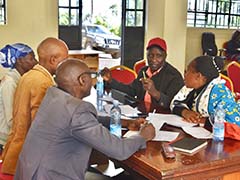
Extension officers supported farmers by asked the question regarding the crops and cropping area for farmers to fill in the form with accurate information.
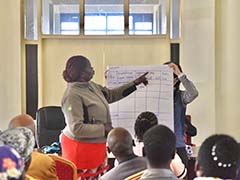
The female farmer presented her record keeping method as reference to other farmers.
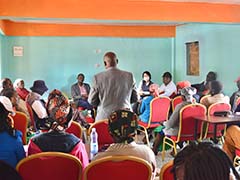
Farmers shared their finding to the participants after filling in the forms.
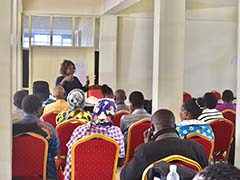
At the end, counterparts (officers of Ministry of Agriculture) explained the coming activities and emphasized the importance of their independence.
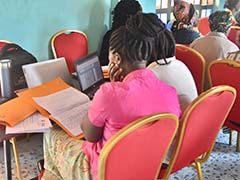
County officer checked data on forms filled by farmers and transcribed them to datasheet.
